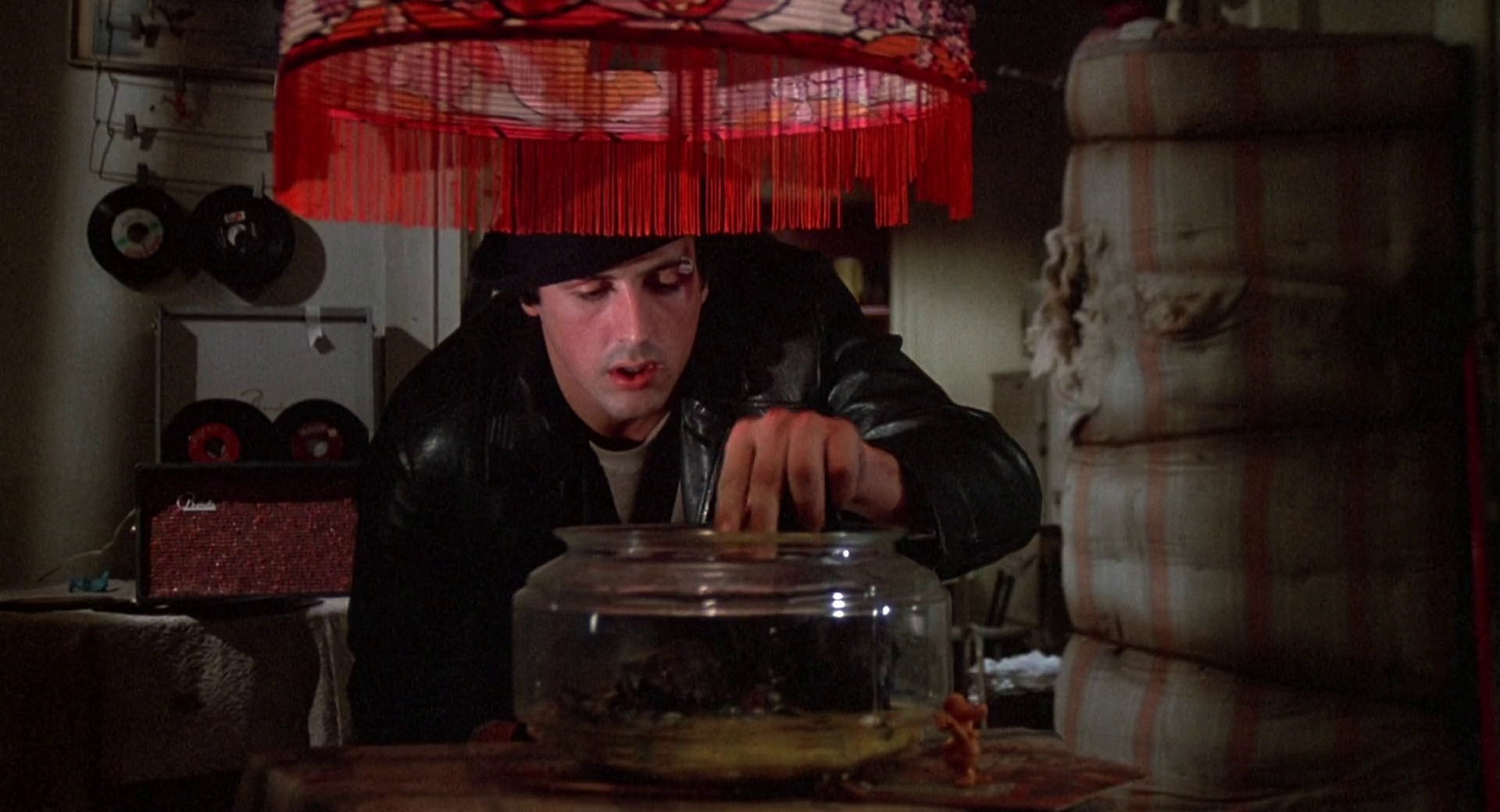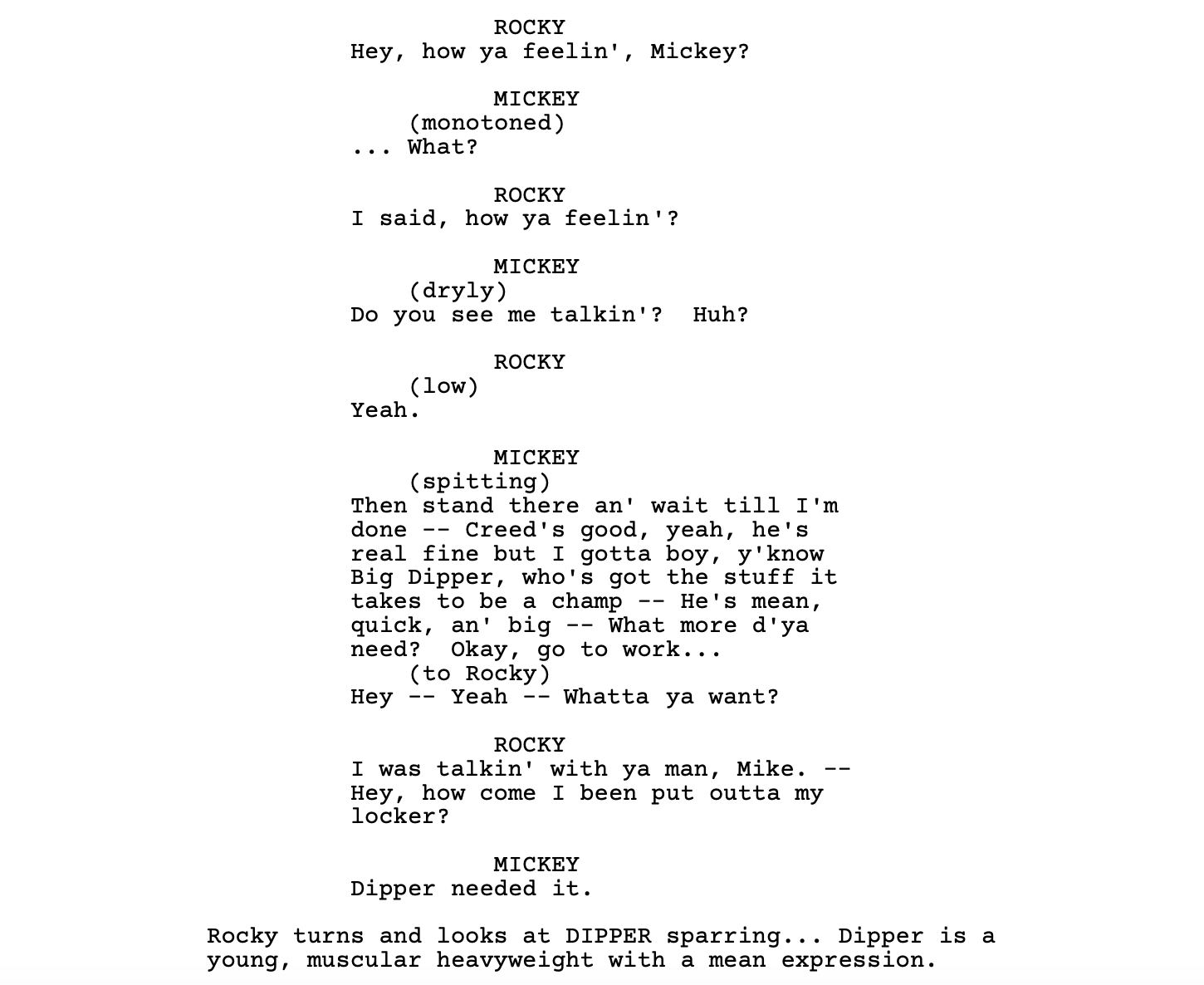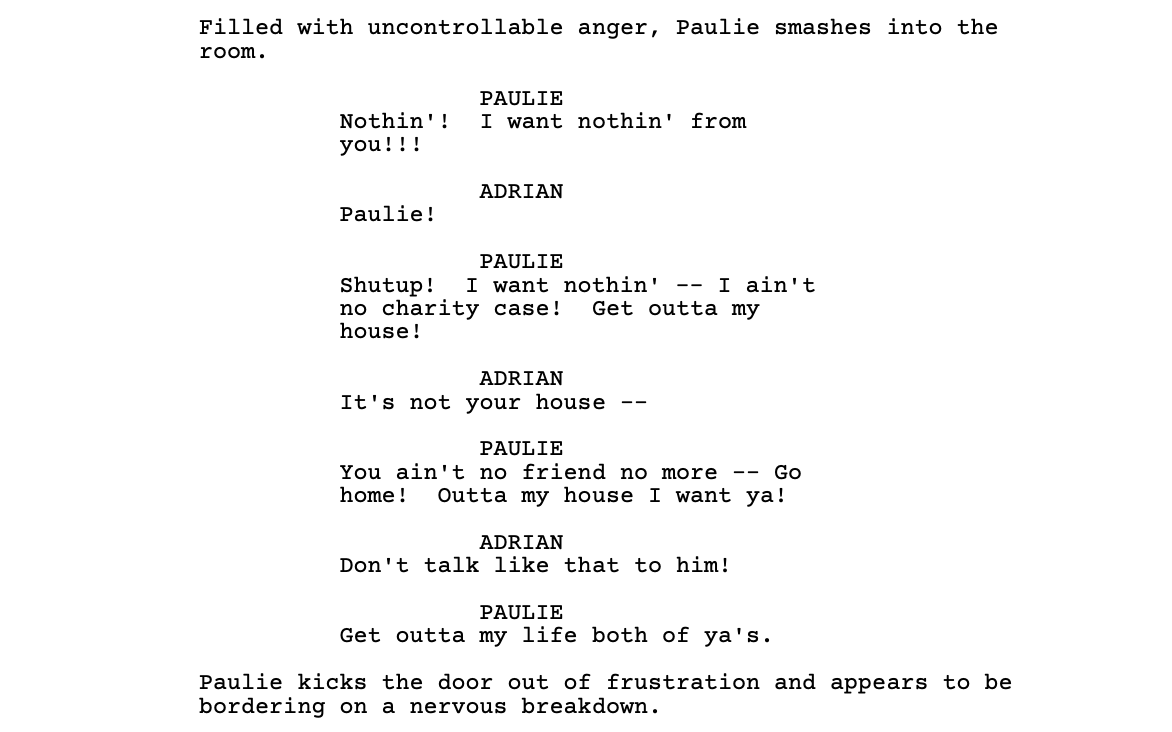Sylvester Stallone and Rocky: How to Put Yourself into Your Scripts
While a household name today, Sylvester Stallone started with what some might call “less-than-humble” beginnings. Born to an astrologer mother and a hairdresser father in the Hell’s Kitchen neighborhood of Manhattan, Stallone dreamed of being someone great. His passions were always writing and acting, but these were not going to be easy accomplishments for someone in his position. An accident during birth left him with paralysis of the face, giving him that famous slurred style of speech he’s come to be known for today (not ideal for an up-and-coming actor in New York). On top of that, having little to no money for most of his life meant minimal connections for getting his screenplays off the ground. In the early days of his adulthood, he faced many obstacles that would dissuade the average man from pursuing his dreams any further: rejections, poverty, and even homelessness, during which he took a job starring in a softcore pornography film just to afford a hot meal. These experiences, however, provided Stallone with immense life experience and taught him about what it truly means to strive for the American Dream, all of which he incorporated into what many consider his magnum opus: the 1976 film Rocky. Through freak luck and an unexpected friendship with then-Happy Days star Henry Winkler, Stallone was able to develop an interest in his script around Hollywood. The only issue with getting it off the ground? Stallone refused to sell it unless he was able to play the lead himself. In what can only be described as poetic, Stallone’s life before and after writing Rocky parallels almost directly with the protagonist himself. Like Rocky Balboa, Stallone dreamt of greatness, endured the storm, and bet on himself in the face of immense opportunity–all leading to a life of success that most can only dream of. Which brings me to my point: How much of themselves should a writer implement into their scripts? What perspectives do they bring to the table that others don’t? And how do they mix these perspectives into an interesting plot without making the film strictly autobiographical?
OPENING IMAGE
The film opens in the middle of an underground, low-ranking boxing match between Rocky Balboa, our rugged, Italian protagonist, and an unknown opponent.
The ring is small, the venue’s abysmal, and the small number of people who are in attendance are hammered. This is where Rocky’s at in life. Still, from the way the fight’s shaping up to be, we can tell two important things from this man: he’s tough as nails and he’s stubborn as hell.
SET UP
Rocky ends up winning the fight and returns to the locker room, where he’s paid $61 for his victory. He exits the small boxing venue and goes about his usual walk home through the streets of South Philadelphia, passing by a small pet shop with a dog in the window.
He finally reaches his small, worn-down apartment and immediately greets his two pet turtles (he’s a softie for animals). To him, this is home.
The next morning, he goes out walking along a Philadelphia construction site, approaching a frightened crane operator.
It’s revealed that Rocky has a side job collecting debts for a local Mafioso, with the additional responsibility of having to injure anyone who doesn’t pay up. He doesn’t want to do it, it doesn’t align with his morals, and he usually doesn’t even have it in him to go through with the injuries–but without this job, he’d be broke.
This part of the script represents everything Stallone had to do to survive before getting his big break (which, like I said, ended up being this film). During an interview about his questionable past starring in the softcore pornography film The Party at Kitty and Stud’s, Stallone stated: “It was either do that movie or rob someone, because I was at the end of my rope”. This is exactly where Rocky’s at right now.
Later, Rocky once again passes by the small pet shop near his apartment. He looks through the window as usual, but this time spots Adrian inside–a shy, awkward young lady who works there (and the real reason he’s always stopping by). Rocky comes in regularly to buy turtle food and flirt with Adrian, who rarely reciprocates his energy.
Despite the lack of success, Rocky keeps trying with her (just like he does with his fighting career and just like Stallone did with his acting career). Like I said, this man is stubborn.
After his encounter at the pet shop, Rocky meets up with his boss, Gazzo (the Mafioso I mentioned earlier). He’s mad at Rocky for not breaking the guy’s thumb, but something about Rocky charms him, so he can’t be too mad.
While it is a small detail, I always found the fact that Stallone made Gazzo a friendly, likable individual fascinating. Most people writing a mob boss character can’t wait to make them as scary and intimidating as possible, but Stallone doesn’t do this. Instead, he chose to depict him as someone who’s always rooting for Rocky; someone in his corner. Whether Stallone did this because he knew a man like Gazzo in his past or because he wanted to emphasize that people aren’t always what they seem to be is unknown, but it makes for a nice change of pace within Rocky’s rocky personal life.
The next day, Rocky goes to the local boxing gym to train. He discovers that the gym’s ornery, elderly owner, Mickey, has given his locker to someone else and has dumped all his belongings in a bag.
Mickey goes on to tell Rocky that Dipper’s a contender, while he’s just a washed-up bum who won’t be fighting for much longer and doesn’t deserve the locker.
That night, Rocky once again stops by the pet store and offers to walk Adrian home after work. She shyly declines, of course, and Rocky leaves disappointed.
He goes to a local bar to meet up with his troubled friend, Paulie, who we discover is Adrian’s brother.
On the TV at the bar, Rocky watches a post-fight interview with the current heavyweight champion, Apollo Creed, who promotes his next big fight in Philadelphia: the Bicentennial Heavyweight Championship.
After the interview ends, Rocky and Paulie make their way home. Before Paulie leaves, he invites Rocky to dinner at his and Adrian’s apartment for Thanksgiving. Rocky agrees to stop by. As much of a loser Paulie is, he’s all Rocky’s got. Plus, he gets to see Adrian again.
INCITING INCIDENT/MIDPOINT
We cut to Apollo Creed and his team as they have a difficult conversation. Apparently, Apollo’s opponent for the Bicentennial Championship broke his hand and is unable to fight, so they have to find a replacement fast.
They go through the list of available ranked contenders to no success until, finally, Apollo comes up with a new idea…
They go down the list of local Philadelphia boxers until one name catches Apollo’s eye.
Meanwhile, Rocky arrives at Paulie and Adrian’s for Thanksgiving. Unbeknownst to Adrian, Paulie had told Rocky he could take her out on a date that night. She refuses because she’s making a turkey all day. Paulie, drunk as usual, thinks it’d be a good idea to chuck her turkey into the street to persuade her to go out with Rocky (real nice brother, right?).
And they do have a good time. Rocky takes Adrian out ice skating before the two go back to his apartment for a quiet night in (where they even share a kiss). For once, he’s found some peace in his life.
That is, until he goes to work out at the gym the next day…
Mickey tells Rocky that a representative of Apollo Creed came into the gym looking for him, presumably to be one of Apollo’s sparring partners. The rep left behind a business card so Rocky can find him.
He goes right away to see what this is all about, eventually finding himself inside a fancy office building owned by boxing promoter Miles Jergins (who apparently was expecting him).
Rocky agrees. The moment of a lifetime is here, and he’s far from ready to take it on.
Now, as I mentioned before in my analysis of Punch-Drunk Love, character-driven films tend to be paced a little irregularly. Rocky spends its entire first act (and a solid chunk of the second) just introducing you to the characters. The inciting incident doesn’t even happen until page 54, which is almost exactly the halfway point of the script. Sylvester Stallone wants the audience to get to know Rocky, see what his life’s like, and grow attached to him as a person. That way, when he does finally get this opportunity, we’re actually rooting for him to win.
DEBATE
At first, Rocky doesn’t have any second thoughts about doing the fight. He’s a fighter, so this is just like any other bout he’s done. On top of that, he and Adrian are officially dating now, so he has love in his corner. But almost right away, the vultures start to swarm. Everybody wants a piece of Rocky.
But oddly enough, he also has some really good people on his side. Even when Rocky tells Gazzo he has to quit working for him to train, Gazzo gives him $500 to pay for expenses.
Later that night, Rocky goes back to his apartment to find Mickey waiting there for him. He wants to be Rocky’s manager.
Even though Rocky should be feeling contempt for Mickey, he doesn’t. Even though he should never let Mickey anywhere near his success, he does. Because, even though the Bible says there are no second chances, sometimes that’s just what people need. Apollo’s giving Rocky a second chance at life, so maybe he should give back as well.
I remember hearing an interview with Sylvester Stallone about what was going through his mind when he was writing this scene, and he said his father. According to Stallone, his dad was someone who never believed in his dreams, but the second he started to find success, his dad was always nearby asking for help. Stallone said no matter how much he wanted to send his dad packing, he just couldn’t. Because sometimes people need what they don’t deserve.
Now Rocky has his support team: a woman he loves, a friend in his corner, a new manager/trainer, and a man willing to help pay for everything. Time to get started.
FUN AND GAMES
The training begins. Rocky wakes up at 4 AM, kills a glass full of raw eggs, and starts running down the streets of Philadelphia (in what would later become one of the most memorable montages in film history). He’s putting the work in.
He makes his way to the butcher where Paulie works to pick up some beef. When Rocky and Paulie get into a minor argument over Adrian, Paulie punches a large piece of hanging beef in frustration. This inspires Rocky, who steps up and takes his own jabs at the meat.
This becomes his trademark workout routine, further highlighting the disconnect between working-class, up-and-coming fighters and the wealthy champions who have every resource at their disposal.
Back at the gym, reporters and fans have flocked to talk to Rocky. The city is on his side, but Mickey’s too focused on training and tells them all to get lost. This sort of attention is for winners, not contenders. Additionally, Rocky doesn’t like all the media personnel surrounding him. And he certainly doesn’t like it when Paulie keeps tipping off reporters about his whereabouts for cash on the side (on ongoing problem leading up to the fight).
BAD TO WORSE
While Rocky and Adrian are watching TV at her and Paulie’s place one night, Paulie returns to the apartment hammered and angry. With Rocky becoming an overnight success and even dating his sister, Paulie’s become a side character in his own life, leaving him resentful.
Already, this opportunity Rocky has bears emotional weight on people other than himself. He doesn’t take Paulie’s tantrum personally, though. Rocky knows that Paulie is really just upset with himself, and he’s been there before.
BREAK INTO THREE
Act 3 begins with the significance of the fight finally starting to settle on Rocky. His face is on TV, magazines, and billboards. Everybody around him is either on his side or wants him to get obliterated, and all this pressure finally takes a toll on him.
FINALE
It’s now the night of the Bicentennial Championship, what everyone’s been waiting for. Rocky prepares himself mentally.
He walks out to the ring with his crew. They’re all wearing simple, plain robes–there to fight. Apollo approaches the ring in a parade float, dressed as George Washington–there for business.
The two touch gloves in the center of the ring and return to their corners. Here we go.
The fight begins. Apollo starts off slow, almost barely trying. He thinks Rocky’s an amateur, so there’s no need to go all out. This whole fight’s just a promotional event for Creed. That is, until he realizes that Rocky’s here to win.
Apollo gets up after 8 seconds, angry that this isn’t going to be a cakewalk. Rocky might actually have a chance.
Rocky has fans everywhere. Paulie watches from the corner, Gazzo cheers him on ringside, and all the guys at the bar scream for him as they watch the brawl on the TV. This fight’s bigger than Rocky, and he knows it.
One more round to go. Apollo’s ribs are broken and Rocky can barely stand up. It’s a bloodbath, but neither will go down. Mickey tries to stop the fight before it can continue.
Just like in Stallone’s life, Rocky should have gave up on his dreams years ago. The pain, the lack of success, the struggle, and with everybody in his life telling him to quit along the way. But he wouldn’t. And he certainly won’t now with only one more round to go.
They both enter the round with everything they’ve got. Trading blow-for-blow, stopping at nothing. Just when you think one of them will fall, they just keep going. The whole round goes this way, leading up to the final ten seconds of the match.
They made it the distance, something nobody thought would happen in a million years. Now it’s all up to the judges.
CLOSING IMAGE
The announcer gives the crowd the results: split decision is Creed’s favor. Rocky’s lost, but he doesn’t care. In his mind, he’s already won, and all he wants now is to see Adrian. The crowd goes nuts and swarms the ring, trapping Rocky in a violent ocean of people.
From the back of the arena, Adrian desperately tries to make her way to Rocky, pushing and shoving past the crowds.
After what feels like an eternity, they finally meet in the middle of the crowd and share a tight embrace. He really did it.
WHY IT’S EXCELLENT
Rocky’s amazing for a long list of reasons. It’s excellently directed, well acted, and probably one of the greatest sport/underdog movies of all time. But what makes it truly special is the screenplay and how masterfully Stallone implemented his own life experiences into Rocky’s. Stallone’s ambitions, struggles, and family dynamics all come through in this script, yet it’s nothing close to a biography. No, it’s something better. He took all of these elements from his own life and integrated them into an amazing story with dynamic characters that anyone can relate to, which is the absolute best way to write anything. I truly believe that in order for a piece of art to be great, it has to come from a unique perspective. And that perspective has to be evident within the art without being a straight-up recreation of the artist’s life. It’s the subtly that makes the art worth interpreting, and as a result it becomes even more interesting to take in. So if you believe you have a unique perspective that just needs to get out to the world, I suggest giving Rocky another watch to learn how to effectively implement it into your scripts.

































































